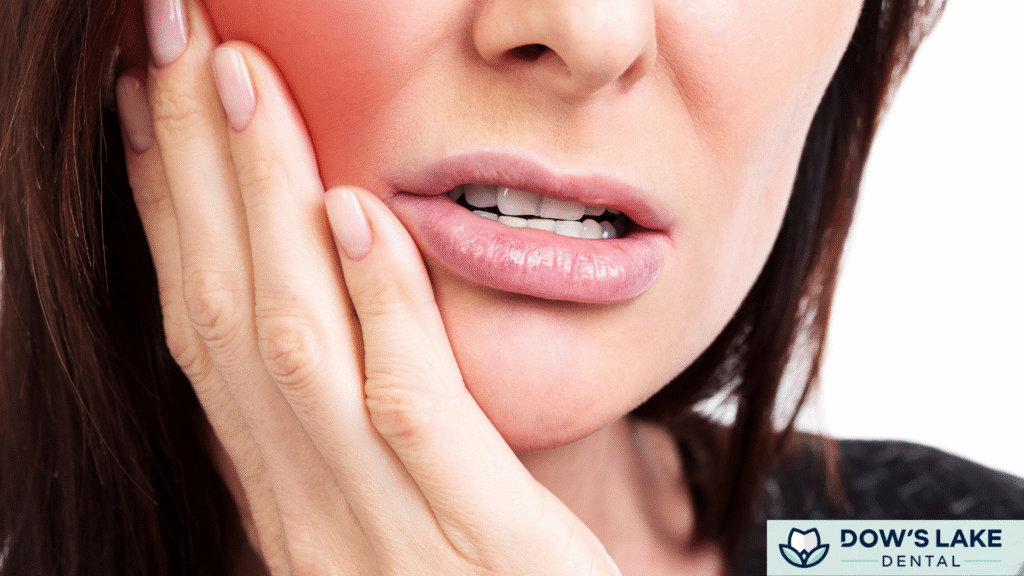Does tooth sensitivity indicate something wrong?

Is it bad to have sensitive teeth? Does slurping ice cream or taking anything hot make you squint due to throbbing pain?
Tooth sensitivity can happen to anyone. If it rarely occurs, it may not indicate that something is wrong. But if it persists and often happens, it may be due to an underlying issue. Don’t ignore it.
Have your dentist in Ottawa, Ontario examine your teeth and mouth. They’ll be able to tell if there are potential dental issues that need treatment.
First, what is tooth sensitivity?
Tooth sensitivity is a sensation commonly triggered by cold,heat or sweets.
The roots of the tooth contain tubules that connect to the dental pulp, located at the center of the tooth. These tubules allow triggers to reach the nerves, which leads to sensitivity.
The nerves only react when there are stimulants. Usually, the teeth become sensitive when the dentin becomes exposed. The dentin is the layer beneath the enamel.
The enamel is strong, but it can wear due to acid attacks. The dentin is much softer and porous. When it erodes, the nerves also lose their protective barrier. This results in heightened sensitivity.
Aside from this, the sensitivity can also be related to other potential issues, such as gum disease.
Why are my teeth sensitive?
The teeth can become sensitive for various reasons, including the following:
- Aggressive brushing. Brushing too hard can strip away the enamel. Using a hard-bristled brush can also contribute to enamel erosion. Flossing and brushing in a gentle, small, circular motion can remove Deposits on the surfaces of the teeth Switching to a soft-bristled brush will protect your enamel against premature wear.
- Gum disease. Gum disease occurs due to inflammation or infection caused by harmful bacteria. Poor dental care is often the cause of gum disease. And one of its signs is gum recession. Receding gums expose the roots of the teeth, which then trigger increased sensitivity.
- Cracked teeth. Cracks on teeth also expose the nerves, which make the teeth sensitive. The tooth can crack due to accidents, physical force, or trauma, but this can be fixed by your dentist. Depending on the scale of the damage, your dentist may recommend getting a filling or root canal therapy.
- Teeth grinding. Left untreated, tooth grinding and clenching can also lead to tooth sensitivity. The grinding motion can leave cracks in the enamel and cause major damage over time. This can also result in sensitive teeth.You may also experience teeth grinding due to stress.
- Hormonal changes. Pregnancy changes the body, including hormonal levels. Blood flow to your gums can increase, leading to heightened sensitivity.
- Changes to your diet can also contribute to tooth sensitivity.
Are sensitive teeth a sign of poor oral health?
Sensitive teeth don’t always mean there’s an infection or a dental problem. It could be due to other causes outside of the mouth, such as pregnancy and hormonal changes.
Sensitivity doesn’t necessarily indicate that you have unhealthy teeth. But if the discomfort won’t go away and is giving you a hard time, be sure to let your dentist know.
They can perform comprehensive oral examinations, diagnose the problem, and recommend a customized treatment plan.
Book a consultation with a dentist in Ottawa, Ontario
The first step to finding out if you need dental care treatments is an oral examination. A sensitive tooth isn’t enough to tell something is wrong.
To schedule a dental consultation in Ottawa, ON, get in touch with us at Dows Lake Dental. We’re happy to arrange a dental visit for you or any family member.


